
PUMPA - SMART LEARNING
எங்கள் ஆசிரியர்களுடன் 1-ஆன்-1 ஆலோசனை நேரத்தைப் பெறுங்கள். டாப்பர் ஆவதற்கு நாங்கள் பயிற்சி அளிப்போம்
Book Free Demo"Golu Grows a Nose" is set at a time when elephants did not have trunks. Despite the fact that the narrative is fictional, it serves to pique readers' interest in how elephants acquired their trunks. Because the story is set before elephants had trunks, it is about elephants with bulging nostrils as the size of a boot; unlike trunks, their noses can only move from side to side. Elephants could no longer take up objects with their noses, as they do now with their trunks.
The protagonist of the story "Golu Grows a Nose" is a baby elephant named "Golu." Golu, too, lacked a trunk and had just a large nose as the size of a big boot. Golu was a great storehouse of inquiries. He was so inquisitive that he kept asking questions to all the animals. Below are some of Golu's questions.
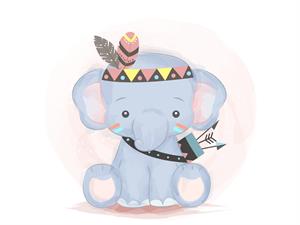
Golu
"Why don't you ever fly like other birds?" Golu questioned his tall aunt, the ostrich. "What makes your skin so spotty?" he inquired of his giraffe uncle, "Why are your eyes always so red?" he questioned his huge uncle, the hippopotamus. "Why do melons taste like melons?" He enquired of his hairy uncle, the baboon, "Why do melons taste like melons?".
A baboon is a big African or Asian monkey with a long face that resembles that of a dog.
The ostrich, giraffe, hippopotamus, and baboon all failed to respond to Golu's questions. According to them, Golu was a naughty baby since he often asked the most difficult questions.
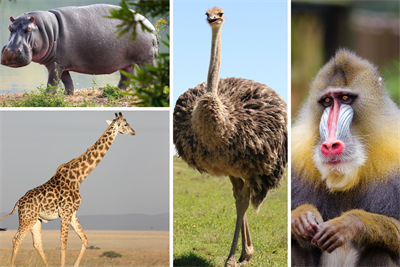
Hippopotamus, giraffe,ostrich, and baboon
One fine day, Golu came upon a Myna bird resting in a shrub. He then approached the bird and began talking to it. And, as is customary, Golu began by posing a question. Golu asked Mynah whether it knew what the crocodile would eat at dinner. But, he didn't get an answer from Myna. Instead, Myna told Golu to go to a Limpopo River and figure it out on his own, for it was where the crocodile resided.
The Limpopo River is an actual river and not fictional. The Limpopo River is South Africa's second-largest river, and it's in Africa's interior. It begins as the Krokodil (Crocodile) River in the Witwatersrand region of Southeast Africa and runs eastward to the Indian Ocean through Mozambique.
After talking with Myna, Golu returned home. He chose to go to the Limpopo River to see the crocodile after some thought. So, he gathered a hundred sugar canes, fifty dozen bananas and twenty-five melons. He then bid his goodbyes to his family, informing them that he was off to Limpopo river in search of an answer for what a crocodile would eat for its dinner.
After talking with Myna, Golu returned home. He chose to go to the Limpopo River to see the crocodile after some thought. So, he gathered a hundred sugar canes, fifty dozen bananas and twenty-five melons. He then bid his goodbyes to his family, informing them that he was off to Limpopo river in search of an answer for what a crocodile would eat for its dinner.
On the way to the Limpopo River, Golu came upon a python. He then asked the python questions about crocodiles, such as their look and what they eat for dinner. Golu, on the other hand, received no response as the python remained silent while it uncoiled from a tree branch. The python was then gently helped in re-coiling around the branch by Golu, who then bid him farewell. This shows Golu's helping nature. In addition, Golu had not anticipated python's help in return.
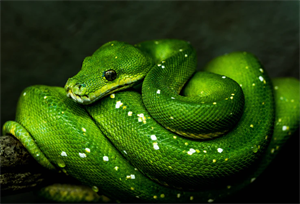
The python
Golu then continued on his journey, consuming sugar canes, bananas, and melons along the way. He arrived on the banks of the wide, green Limpopo river after a few days. On the riverbed, he came upon a log of wood.
It was a crocodile, not a log that Golu had noticed on the riverbed. And Golu, unaware that it was a crocodile, inquired as to whether it (crocodile) had ever seen a crocodile. The crocodile winked once again, raising part of his tail from the mud around him.
The crocodile asked why Golu was so fascinated by it (the crocodile) and asked so many questions about it. Golu told the crocodile that he wanted to know about the crocodile. Taking advantage of the baby elephant's curiosity, the crocodile decided to play a trick on him.
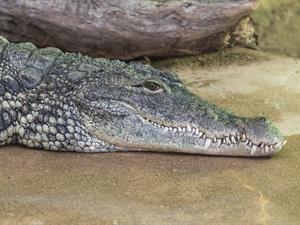
The crocodile's plan
The crocodile asked Golu to approach it and disclosed that it was the crocodile Golu had come to meet. It also shed crocodile tears to reassure Golu that what it said was real.
Crocodile tears, on the other hand, refers to the fake, afflicted tears. It's based on the idea that crocodiles cry to lure their prey. Crocodile tears help the crocodile get its victim because the prey will trust the crocodile's tears and approach it closer.
When Golu was urged to approach the crocodile closer, he was terrified.
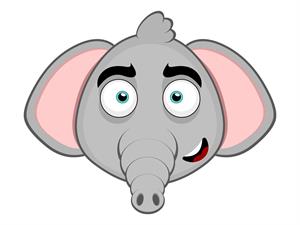
Golu's fear for crocodile
Still, he sat down on the bank and informed the crocodile that it (the crocodile) was the one Golu had been waiting to meet for days because he was curious bout what it would eat for supper. The crocodile took advantage of Golu's curiosity.
For the third time, the crocodile enticed him closer, offering to whisper the answer to Golu's query. The innocent Golu put his confidence in the crocodile and approached it. But, the crocodile suddenly grabbed Golu by the nose as he lowered his head near the crocodile's snout. After that, the crocodile informed the young elephant that he would be eating a baby elephant for dinner. Golu cried, begging the crocodile to release him, but the crocodile refused. Golu's curiosity and innocence eventually brought him into trouble.
Suddenly, the python that Golu had previously encountered reappeared. Since the time Golu left it after wishing it farewell, the python seemed to have been following it. It (the python) then moved down to the riverbed and helped Golu. It (the python) warned Golu that the crocodile would take him into the stream if he didn't pull as hard as he could.
Golu pulled hard on his haunches, and the crocodile dragged him even harder. With a great sweep of its tail, the crocodile rushed into the water and continued to drag Golu with considerable effort. For a long time, Golu and the crocodile were pulling each other.
The python ultimately wrapped itself around Golu's stomach, allowing him to pull even harder. Though the python's assistance had little or no effect, it gave Golu more confidence in knowing that he had someone behind him to encourage him. Then Golu dug all four legs into the mud and pulled.
However, Golu's nose kept extending further and longer as he pulled, causing him pain. Golu could finally escape the crocodile's onslaught, but his nose grew to be five feet long.
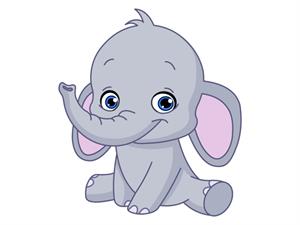
Golu's expanded nose
Golu sat down and covered his nose in a large banana leaf, which he hung in the cold, Limpopo river. Golu waited for his nose to cool and shrink for over two days. It became cooler, but not smaller. The trunk of Golu remained unchanged.
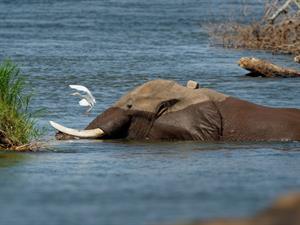
Golu- trying to shrink his nose
Toward the end of the second day, a fly landed on Golu's shoulder and stung him. Golu lifted his long nose (trunk) and killed the fly by hitting it with his trunk. The python quickly pointed out that Golu couldn't have done it without his trunk. As a result, the python claims that Golu's long snout was an advantage. According to the python, this was the first advantage. The python then instructed Golu to eat using his trunk.
Golu plucked a bunch of grass with his trunk when the python urged him to eat. After brushing it on his forelegs, he put it in his mouth. The python declared it to be a benefit of having a long snout once more, pointing it out as a second advantage.
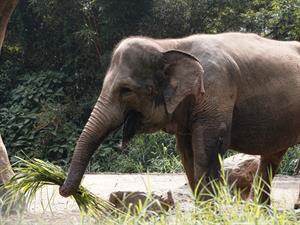
Golu-plucking grasses
The python then told Golu that it was too hot. Since it was extremely hot, Golu scooped some mud with his snout and slapped it on his head. It was a third advantage, according to the python, because Golu wouldn't have been able to do it without a long snout.
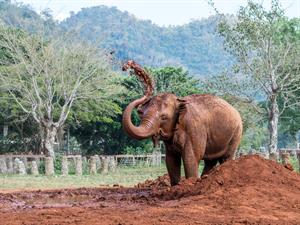
Golu-spraying mud on its head
Golu eventually saw the benefits of the expanded trunk and thanked the python for his assistance. Through his encounter, Golu also learned about the hazards of curiosity. Curiosity is beneficial in broadening one's worldview, yet it may also lead to terrible circumstances.
Second, Golu understood the value of helping others since, as a result of his assistance to the python, he (Golu) was assisted at a time of need.
Finally, Golu returned home, having realised his mistakes and the benefits of having a big nose.